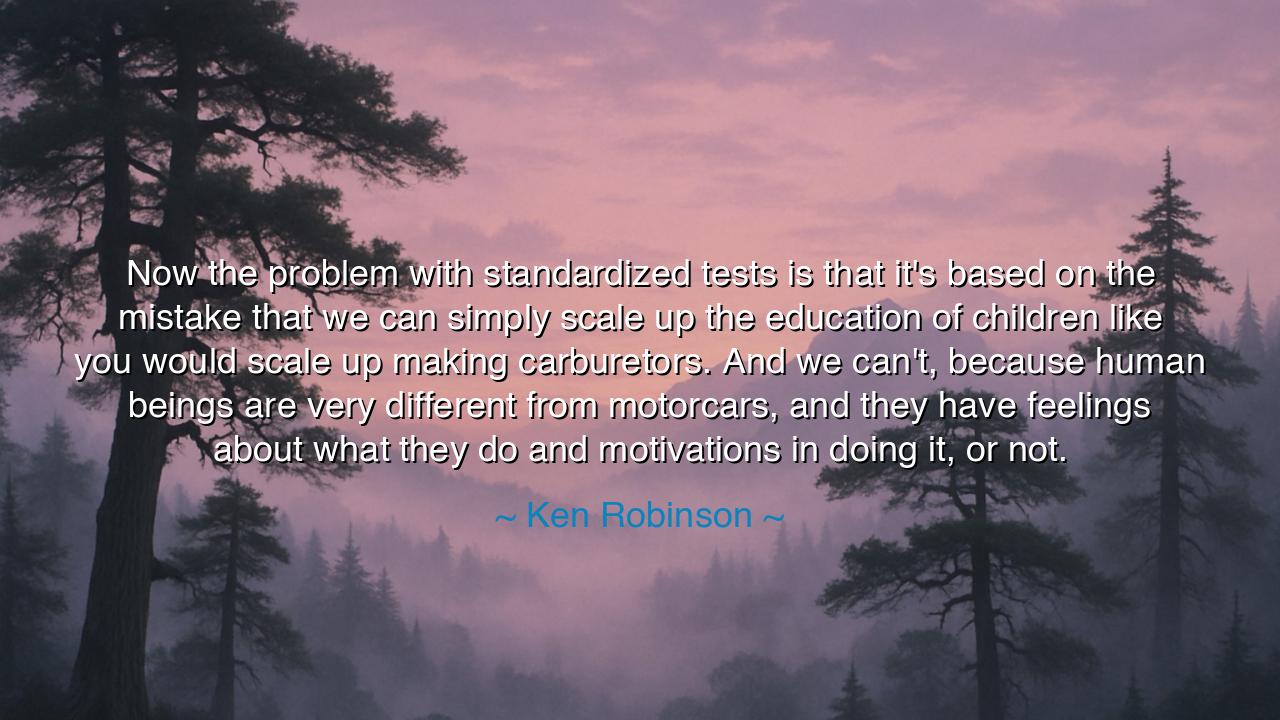
Now the problem with standardized tests is that it's based on the
Now the problem with standardized tests is that it's based on the mistake that we can simply scale up the education of children like you would scale up making carburetors. And we can't, because human beings are very different from motorcars, and they have feelings about what they do and motivations in doing it, or not.






The great sage of creativity, Ken Robinson, once spoke with fire and clarity: “Now the problem with standardized tests is that it’s based on the mistake that we can simply scale up the education of children like you would scale up making carburetors. And we can’t, because human beings are very different from motorcars, and they have feelings about what they do and motivations in doing it, or not.” In this bold declaration, he tore the veil from the illusion of industrialized schooling, showing that the child is not a machine to be assembled, but a living soul to be awakened.
At its core, this saying attacks the false worship of uniformity. Standardized tests were born in an age when factories ruled the earth, when efficiency was the highest god, and when children were seen as products to be measured, ranked, and processed. The factory built carburetors with steel and fire, each identical to the other, and men began to think the same could be done with education—that children, too, could be poured into molds, tested by machines, and stamped with grades. But Robinson proclaims the eternal truth: human beings are not motorcars. They cannot be scaled, nor reduced, nor made identical.
Consider the story of Albert Einstein. As a boy, he was slow to speak, and his teachers judged him dull. Had his worth been measured only by standardized exams, he would have been marked as a failure, another broken piece on the assembly line. But within him burned a fire that could not be captured by tests—an imagination that reshaped physics, time, and space. His genius was not in conformity, but in the unmeasurable realms of curiosity and wonder. Robinson’s warning is clear: when we reduce children to test scores, we risk crushing the very brilliance that might change the world.
And history gives us yet another witness: the Renaissance, that great flowering of art and thought. Leonardo da Vinci, Michelangelo, Galileo—all were men who followed passions beyond what could be measured. No standardized test could capture the creativity of da Vinci’s sketches or the vision of Galileo’s telescope. Their greatness was not born of uniform drills, but of freedom to explore, to create, to dream. This is what Robinson defends: the right of every child to be seen as a living soul with feelings and motivations, not a machine to be tested.
The deeper wisdom of his words lies in the recognition that education is a living relationship. A child learns not because a system commands it, but because something within them is stirred—by curiosity, by encouragement, by love. To treat children as machines is to deny their humanity. To honor them as individuals is to release their potential. This is why Robinson insists that scaling up education like one scales up factories is folly; human growth is not mechanical, it is organic, like the growth of a tree.
The lesson for us is profound: do not judge others, or yourself, by the narrow bars of standardized tests. Seek the spark of individuality, nurture it, and protect it. Parents, see your children not as scores, but as souls. Teachers, remember that behind every test sheet is a heart with dreams, fears, and gifts. Leaders, build schools not as factories, but as gardens, where diversity is strength and growth is nurtured in many forms.
Practical action follows: encourage creativity as much as correctness. Celebrate talents beyond numbers—music, art, invention, empathy, leadership. Challenge the systems that reduce children to ranks and advocate for models of education that honor their humanity. In your own life, resist the temptation to see yourself as a product of tests; measure yourself instead by your passions, your growth, your contributions to others.
Thus, Ken Robinson’s words ring out as a call to arms: children are not motorcars, and learning is not an assembly line. Let future generations remember this truth: to educate a child is to awaken a soul, not to manufacture a part. And only when we honor this sacred difference shall we build a world where every human being may grow into the fullness of their destiny.






AAdministratorAdministrator
Welcome, honored guests. Please leave a comment, we will respond soon